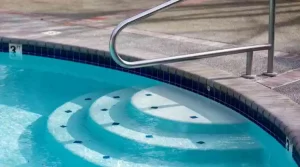What about taking advantage of the summer heat by swimming in a pool? Do you agree that the concept is appealing? But were you aware that in order to make use of it in complete peace and security, you need to ensure that your pool is always well maintained?
If you want to protect your family’s health as well as your own, maintaining the pool and treating the water appropriately are both absolutely necessary.
It is essential to administer more chlorine on a daily basis during this time of year because the pool is getting a lot of use. Because there is a high volume of people coming in and out of an area, it is critical to take precautions against the spread of infectious diseases and the multiplication of germs, which thrive as temperatures rise.
In a perfect world, there would be increased chlorination, filtration, and pH regulation. Constant and consistent attendance is required. Did you know that when there is plenty of suns, chlorine dissolves more quickly? During this time of year, there is also a rise in the total number of pollutants.
How to Properly Maintain the Cleanliness of your Pool during the Summer
But how can you ensure that a pool is clean during the summer months so that you can continue to enjoy the company of your loved ones? The next thing on the agenda is to walk you through, step by step, how to maintain your swimming pool throughout the warmest part of the year.
1. Perform Maintenance Checks at a More Frequent Interval.
Swimming pools require more maintenance throughout the summer months not just due to the higher temperatures and more frequent rainstorms that occur during this time of year, but also due to the fact that they are used more frequently. You will need to pay more attention to the filtration system of your pool, take greater measures to maintain the pH level of the water, and also increase the number of times each week that you chlorinate the water.
In addition, caution should not be confined to the just chemical processing of water. In order to keep everyone safe during the duration of the term, it is essential to perform more consistent maintenance and inspection services.
When temperatures rise, the frequency with which a pool should be maintained and cleaned should increase significantly compared to when the weather is cooler.
2. Increase the Level of Cleaning
Brushing the wall and floor tiles in a swimming pool, as well as the edges, and using a suction device to gently remove anything that has been deposited on the bottom or in the corners are some of the preventative measures that should be performed.
In addition to that, you need to clean the dirt that is on the water’s surface, such as the leaves and insects. In most cases, the use of nets is all that is required for this kind of collecting.
There is a greater accumulation of dirt in the pool as a result of factors such as sunscreen being applied more frequently when temperatures are higher than normal. During the warm months, regular cleaning should be performed more frequently, at least once or twice a week.
3. Improve the Level of Filtering
Water filtration is yet another significant component that belongs to the category of “physical care” for the pool. Because contaminants in the water have a tendency to accumulate when there is more continuous usage of the pool on hot days, the filtration period ought to be lengthened throughout the summer months.
Additionally, water filtration should be done at least once per week, or even twice per week if necessary. It is important to clean the skimmer, which is also known as a sieve, before beginning the filtering process. This will remove any dirt that has accumulated and allow water to flow more freely.
4. Keeping an Eye on Water Treatment
If the pool does not receive the maintenance that is required, using it might subject one to a number of risks and be harmful to one’s health. The accumulation of fungi, bacteria, and other contaminants in water that is not treated on a regular basis is possible. This can result in the infamous mycoses, in addition to other, more severe disorders.
5. Chlorinate the Water on a Daily Basis
It is important to chlorinate your pool on a regular basis during the summer months; doing so will keep the water from becoming hazy. Because the pool receives an excessive amount of sunlight, the chlorine in the water breaks down more quickly, and as a result, it must be replaced on a regular basis.
6. Maintain Proper pH Levels.
The application of chemicals is required in order to get the desired results of having water that is both pristine and healthy. However, in order to preserve a healthy pool, it is essential to keep the equilibrium of these components that are present in the water at all times. During the summer, in addition to using various chemicals for physical cleaning, you will be chlorinating the pool on a daily basis. Because of this, you should monitor the alkalinity and pH levels of the water continuously. If a swimming pool does not have an effective pH control system, the water in the pool might irritate the eyes, as well as cause harm to the skin and hair.
7. Place a Cover Over the Pool
Have you taken into account all of the recommendations and care? Now simply make sure your pool is covered! A cover is an excellent tool for preserving the quality of the water in the pool while also preventing pollutants and dirt from getting in. Find a way to put it to use once more, and make the most of the rest of the season.







